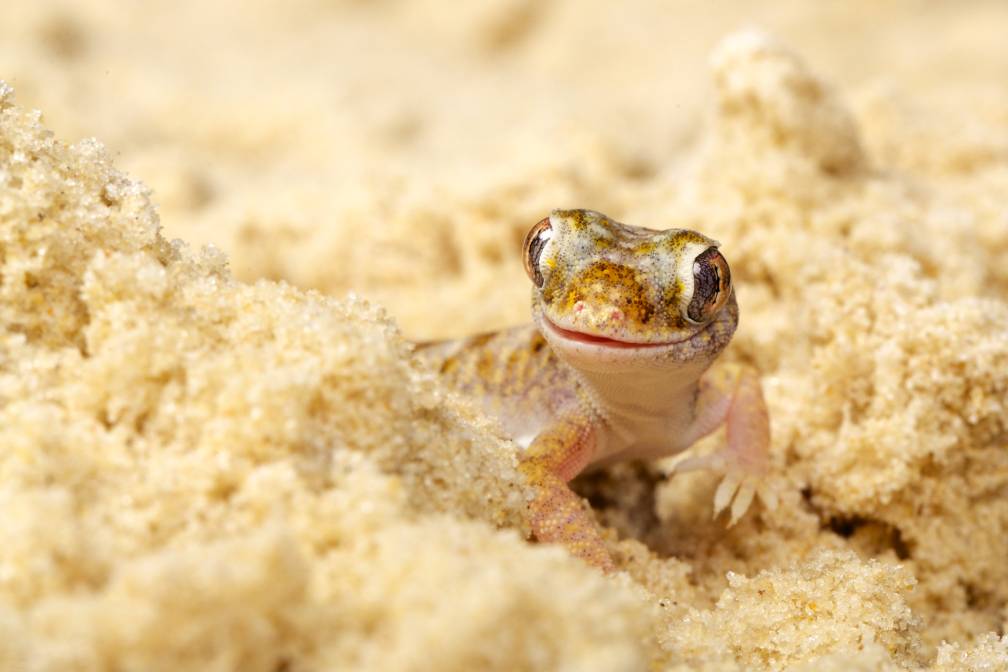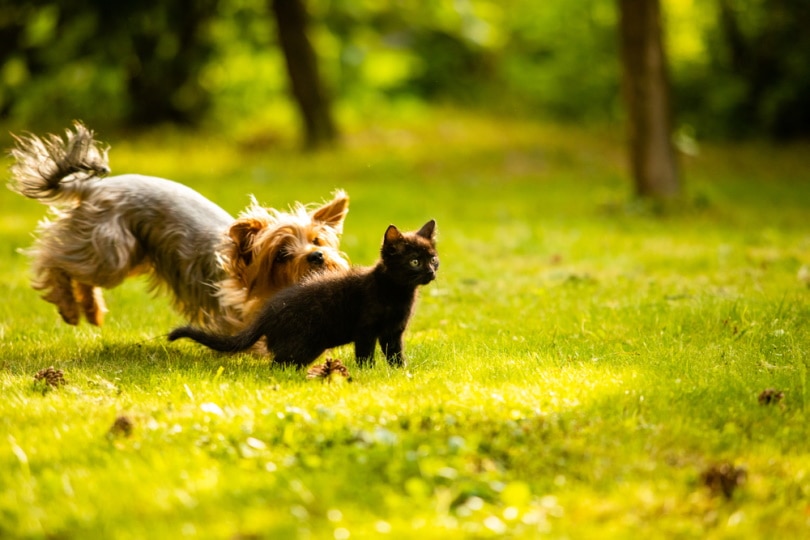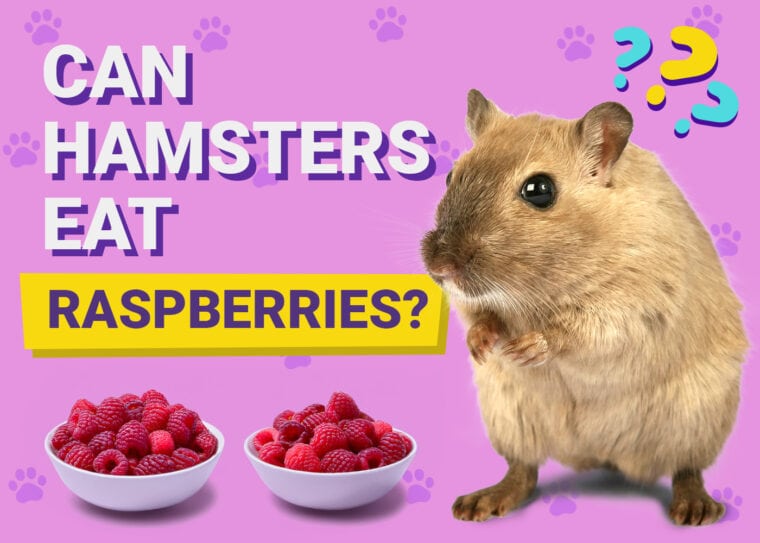
Your little hamster munching on a piece of food is one of their cutest actions. You might want to hand over a hamster-safe snack to your buddy when you’re snacking yourself. Fortunately, hamsters can have a long list of fresh fruits and vegetables that are safe for them. But can hamsters eat raspberries? Yes, hamsters can eat raspberries!
However, don’t rush to the store yet—there’s more you should know. Even though raspberries are perfectly safe and healthy for your rodent, not everything raspberry is acceptable. Let’s take an in-depth look into how many and what kinds of raspberry treats you can offer to your hamster.
Nutritional Facts of Raspberries
Raspberries are delicious, soft fruits related to blackberries. They are full of beneficial vitamins and minerals that are super healthy, even for our hamster friends. Raspberries are also low in calories and high in fiber.

A serving of raspberries contains1:
Are Raspberries Good for Hamsters?
Raspberries have lots of valuable properties that do wonders for your hamster’s overall health. As long as you portion their snacks correctly, a raspberry can give your hamster an extra boost of nutrients.
Like most berries, raspberries contain many antioxidants, which are beneficial for your pet. They contain other vitamins and minerals that may also offer benefits to your hamster. But since raspberries contain natural sugar, you do have to limit their intake.
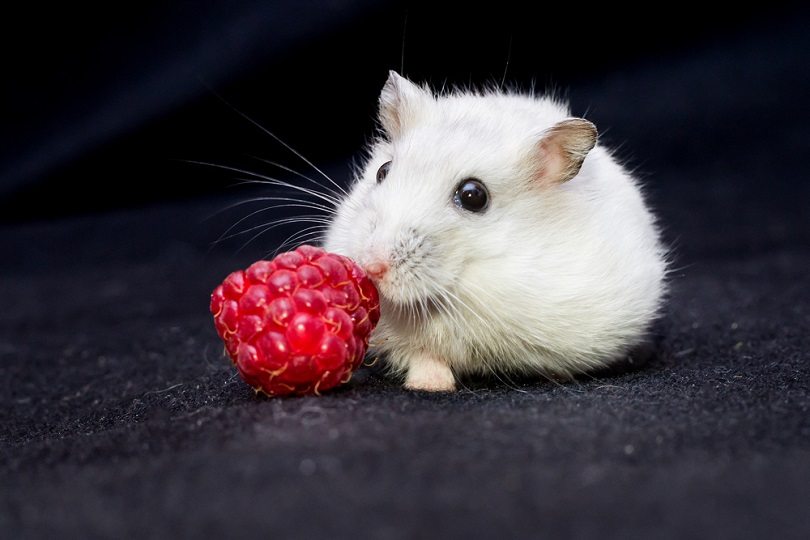
Fresh fruit is one of the healthiest additions that you can put on the menu for your hammy. Plus, your hamster will probably love the punchy taste of a raspberry.
Raspberries have many spectacular benefits for your little hamster, but like anything else, these delicious red berries do their magic in small doses.
Potential Risks of Raspberries for Hamsters
Raspberries are not without their nutritional risks and downsides.
Calcium-to-Phosphorus Ratio
There have been several studies on calcium-to-phosphorus ratios in hamsters. Normal bone formation tends to occur in hamsters that have higher amounts of calcium in their diet when compared to phosphorus2. However, vitamin D is important for regulating these minerals, and in its absence, hamsters can develop rickets.
The higher levels of phosphorus in raspberries (when compared to calcium) are considered a potential drawback, as phosphorus naturally binds to calcium within a hamster’s body. If there is excess phosphorus, the body responds by pulling calcium out from the bones to bind with the excess.
Feeding raspberries to your hamster on occasion means there’s no reason to panic, especially when they are offered as a part of a diet that contains other items (which is how they should be served). However, this risk is considered noteworthy if hamsters are fed excessive numbers of these berries or foods with similar calcium-to-phosphorus ratios.
A proper amount of calcium in a hamster’s diet may also help prevent dental issues, and therefore, the value of this mineral shouldn’t be understated. However, it is important to not go overboard with supplementing your pet’s diet with calcium. High amounts of calcium have been reportedly linked to bladder stones in hamsters. Likewise, calcium has been shown to activate certain enzymes in a hamster’s body that are related to heart issues3.
The amount of calcium that your hamster needs will vary depending on their age, reproductive status, and the rest of their diet. It is best to consult with your veterinarian to ensure that your hamster’s dietary needs are being met properly.

Sugars
As fruits, raspberries contain naturally occurring sugars. These partly contribute to their energy yield. However, excessive amounts of sugar aren’t good for hamsters for several reasons. For one thing, it can lead to dental issues.
Two forms of natural sugars have been demonstrated to be problematic for hamsters: lactose and fructose. Other forms of sugar that are also found in raspberries, sucrose and glucose, aren’t entirely risk free either. It is worth noting, though, that the adverse effects of these sugars are only noticeable when they are offered in high amounts in a hamster’s diet. Still, raspberries naturally contain all these sugars.
It is impossible to definitively say that these sugars will lead to an animal’s demise, but experiments have shown that high amounts of sugar are definitely detrimental to hamsters, thus reducing the appeal of raspberries (and other fruits).
Low Fiber & Protein
Although raspberries do contain fiber, the amount that they offer is relatively low compared to other safe mainstays in a hamster’s diet. For example, hay is a much better alternative for meeting your pet’s fiber needs.
Likewise, while raspberries have some protein in them, the protein requirements of hamsters exceed those offered by this fruit, so raspberries alone are insufficient.
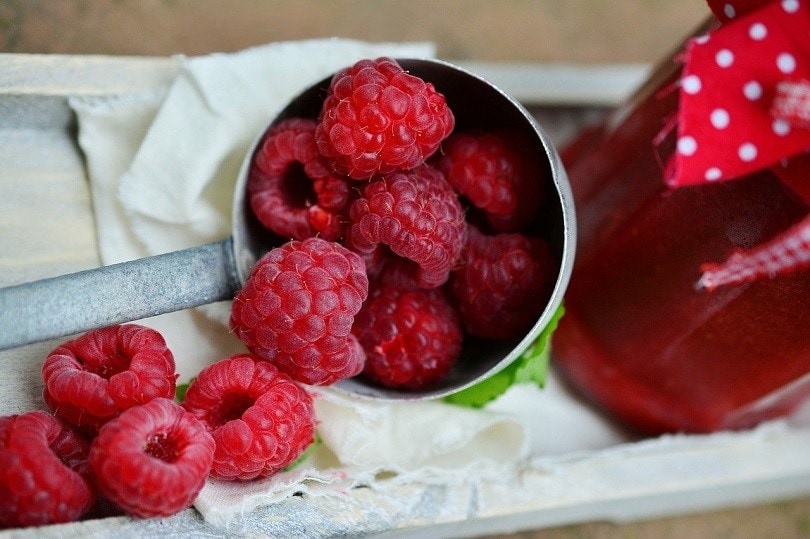
High Moisture
Although the amount of water in fresh raspberries might seem appealing, it is important to note that hamsters do not handle a sudden increase in water from their food that well. In fact, most of their diet comprises dry matter, and they seem to do best when fed such foods and left to control their own water intake as necessary.
A sudden influx of water from vegetables or fruit might result in a hamster that’s dealing with an episode of diarrhea. Unfortunately, this is a serious ailment for hamsters and requires urgent veterinary care.
- Important: If your hamster has diarrhea, you should not attempt to rehydrate them with plain water, as this will make things worse. You should seek a product made specifically for rehydrating hamsters, available from your pet store or veterinarian. Diarrhea in hamsters should not be taken lightly, and if you notice diarrhea in your hamster, you should seek prompt professional care for them.
Hoarding
Hamsters are instinctive hoarders. They like to stuff food in their large cheeks to transport it back to their favorite hiding places or den to consume later. Wild hamsters instinctively do this because the ability to hoard food enables them to eat in peace without disturbances from predators or other threats. Pet hamsters may also demonstrate this habit.
Your hamster may take fresh raspberries to their favorite hoarding spots. It is important to thoroughly check these spots to remove food items that spoil quickly. Rotting food in your hamster’s cage can lead to health issues for your pet.

Cheek Pouch Issues
Hamster cheek pouches are large, but notably, they don’t produce any saliva. Foods high in moisture can sometimes get trapped in their cheek pouches, leading to impaction and disease. This scenario requires prompt medical care.
FAQ: How Many Raspberries Can You Give Your Hamster?
Before you give any fruit to your hamster, you have to make sure you rinse and wash the berries thoroughly. Many fruits have pesticides on the outside, and you don’t want your little fluff ball getting sick.
A good rule of thumb is to offer a small section of raspberry that is about the size of your hamster’s head. You can give this amount to your hamster no more than once a week. Always make sure the berries are soft, room temperature, and small enough to chew.
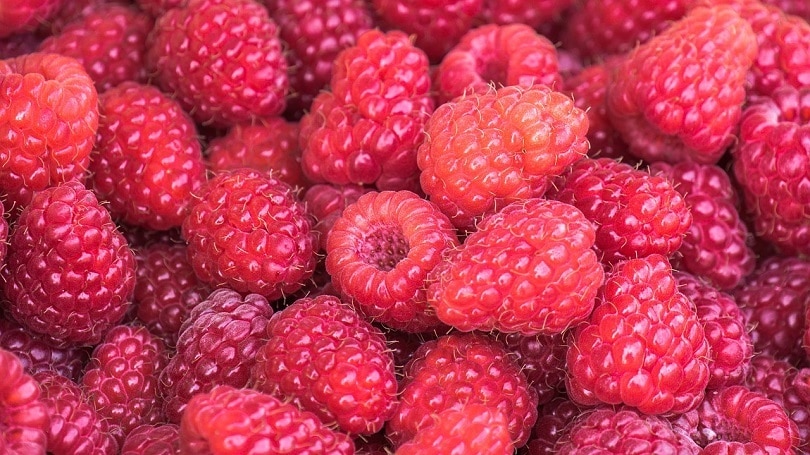
FAQ: Are All Types of Raspberries Safe?
Fresh fruit is healthy for your hamster in moderation, but raspberry-based foods come in many forms—not all are edible for furry friends. Anything that has ingredients apart from raspberries should be closely examined before serving.
Any food item with high sugar and preservatives should be off the menu. Hamsters have strict diets and do not benefit from artificial additives in their meals.
- Tip: If your raspberries contain anything extra, don’t give them to your hamster. Even if you think that a raspberry that you plucked from a pie is safe, it may not be, and it’s always better to be safe than sorry. If you have any serious questions about food safety, consult with a trusted animal professional.
Final Thoughts
If you are worried about giving your hamster a taste of a raspberry, don’t be! Your little one will probably love these scrumptious fruits. Just remember to wash them thoroughly to get rid of any pesticide residue, thaw out the berries if they are frozen, and cut them into appropriate portions.
If you keep snacktime light, you can give raspberries to your hamster every week if you so choose. They could become a new favorite in no time! Remember, though, each hamster has a preference, and yours might not even like raspberries, but they are still a nutritious choice.
See Also:
Featured Image Credit: congerdesign, Pixabay








